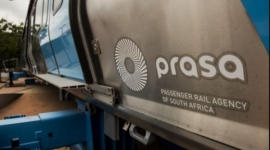
The Passenger Rail Agency of South Africa (PRASA) has identified about 3 000 employees who have yet to be verified and are currently seen as ghost employees.
This is according to the preliminary findings of the agency’s ZIVEZE project, which conducted an employee verification exercise that commenced on November 2021 nationally and is planned to run until February 2022.
Addressing a media briefing on Tuesday, Chairperson of the PRASA Board, Leonard Ramatlakane said the exercise followed a test identity verification that indicated that the organisation might have just over 30 non-South Africans and unverified ID numbers.
"The preliminary findings have revealed that of the 17 200 employees of PRASA, about 3 000 employees are yet to be verified and currently have been seen as ghost employees. The PRASA board is also investigating foreign nationals with false identity documents,” Ramatlakane said.
The final report will be ready for implementation on 31 March 2022.
In May last year, the PRASA Board of Control approved a skills audit, with a budget of R 10 million approved and allocated by Group Finance on 11 June 2021. The split of the costs is R9.5 million for the National Skills Audit and the remainder for Qualifications Vetting of Management categories.
The skills audit project is expected to commence in April 2022 for a period of 18 months covering 17 195 employees.
The PRASA board will also be initiating lifestyle audits.
The Board has been tasked with reviewing PRASA’s business model and organization design to improve the capacity of the organization.
“A diagnostic review by a project team revealed that PRASA had an inefficient operating business model, with multiple duplications across functions, and weakened Divisions and Regions. To deal with these issues, PRASA went through a verification process with the University of Stellenbosch.
“PRASA is currently engaging the Government Technical Advisory Centre (GTAC) to assist with implementation, conducting organisational work study to ensure that the staffing requirements are at a correct level, review jobs to ensure that the profiles meet the job requirements of a modern organisation,” Ramatlakane said.
He said the priority of the board is to stabilise the organisation, eliminating the many acting positions.
Many of the vacancies are yet to be filled.
Security
In response to rampant vandalism and theft of PRASA’S rail infrastructure, the revised Security Strategy, which was approved in August 2020, will be integrating technology with human deployment.
In addition 3 100 security staff had been recruited by the end of 2020/21. Fencing and walling have been elevated as part of the security strategy to protect the rail system.
“PRASA is constantly under threat from a security perspective, with the pillaging and destruction of the rail infrastructure continuing largely unabated.
“Not only are trains continuously being vandalised, the rail network infrastructure has also been under consistent attack, stripped of copper cables, railway tracks, signalling equipment and overhead electricity cables, and its facilities across the country continue to be vandalised,” Ramatlakane said.
He said inadequate physical access and the lack of adequate security measures to restrict access to passengers with valid tickets resulted in low passenger numbers being recorded.
“This contributed to the declining fare revenue amounts, poor financial performance and allowed for the vandalism to continue.
“There needs to be a holistic security strategy to ensure the assets of PRASA are secure, commuters are safe and fare revenue evasion is combatted,” Ramatlakane said. –SAnews.gov.za


